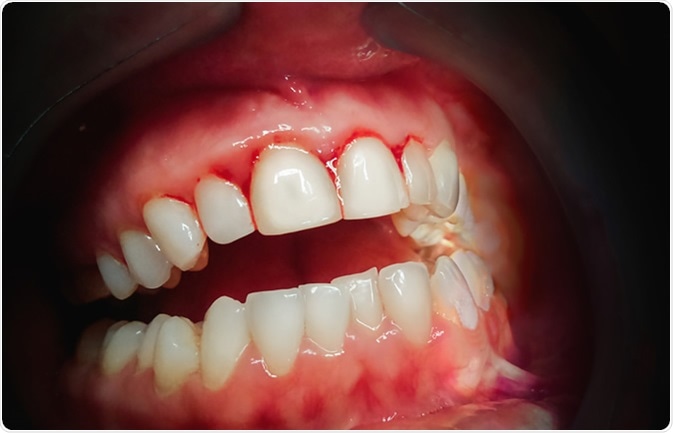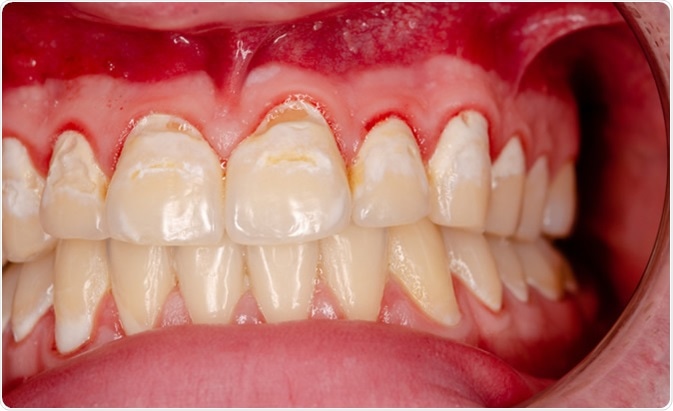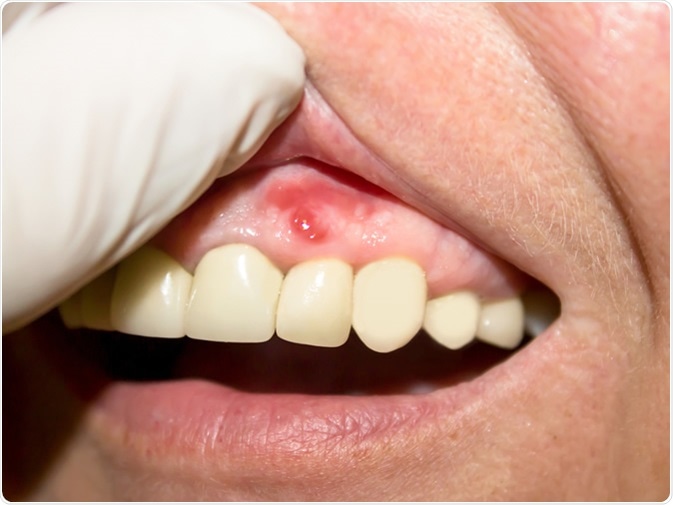Bleeding Gums: When to be Concerned?
Bleeding gums not only indicate dental diseases but could also suggest serious medical concerns. Though it is one of the most common dental conditions, professional treatment should be sought if it is noticed.
Skip to
- Why are bleeding gums important?
- Which medical conditions may cause bleeding gums?
- Bleeding gums due to HIV infection
- Anemia-related bleeding gums
- Herpes infection
- Stress-induced bleeding gums
- Leukemia and gum cancer
- Deficiency of Factor V
- Which dental diseases can cause bleeding gums?
- Gingivitis
- Periodontitis
- Bleeding gums during pregnancy
- Other conditions
- How are bleeding gums treated?

Why are bleeding gums important?
Understanding the primary cause of bleeding gums can help to treat and cure the condition.
Coarse brushing, trauma, injury, gingivitis or initial stages of periodontal gum disease could cause bleeding gums. Some symptoms which are usually observed in such conditions include:
- Persistent halitosis or bad mouth odor
- Painful gingival ulceration (gum sores)
- Excessive gingival pain or discomfort
- Inflamed gums and oral mucosa
- Dental sensitivity
Which medical conditions may cause bleeding gums?
Most of the time, it is challenging to recognize the exact cause of bleeding gums. However, underlying medical conditions should be ruled out. A list of various disorders requiring immediate medical treatment, and whose manifestations could include bleeding gums, include:
Bleeding gums due to HIV infection
HIV is a condition which results in serious infections due to a compromised immune system. This infection is transmitted via blood contact, or having direct sexual contact with an HIV-positive individual, or from an infected mother to the baby.
Various medical issues may arise following HIV infection. This includes dental problems such as bleeding gums, soreness in the oral cavity, including of the tongue, lips or mouth. However, this cause can be confirmed only by serologic testing.
Anemia-related bleeding gums
Anemia is a medical condition caused by the lack of red blood cells in the blood. One form of anemia is pernicious anemia, associated with Vitamin B12 malabsorption, which also causes bleeding from the gums.
Herpes infection
Herpes simplex virus infection can cause severe pain, soreness of the oral mucosa, and bleeding from the gums if involved.
Stress-induced bleeding gums
Stress may result in gingival inflammation which makes the gums more susceptible to trauma. Stress also induces an immunosuppressed state, which encourages bacterial infection and may inhibit normal coagulation processes.
Leukemia and gum cancer
Oral cancer usually manifests in the form of painless eruptions on the surface of the gums, the inner parts of the cheeks or on the tongue, often associated with gum bleeding.
Leukemia can also cause bleeding from the gums, as it results in the production of immature or non-functional leukocytes and platelet deficiency. Other characteristic signs and symptoms include enlargement of spleen and liver, and of the lymph nodes.
Deficiency of Factor V
Factor V deficiency is a bleeding disorder with typical symptoms like bleeding gums, bleeding underneath the skin surface, easy frequent bruising, or nose bleeds.
Which dental diseases can cause bleeding gums?
Gingivitis
Gingivitis refers to inflammation of the gums, and is associated with gum bleeding. However, this condition is treatable if diagnosed early. It is also preventable with proper oral hygiene. Risk factors for gingivitis should be ruled out. These include smoking, diabetes, periods of hormonal fluctuations, especially in females, and dry mouth.

Periodontitis
This condition can also cause bleeding gums, and is one sequel of untreated gingivitis. This condition results in loosening of the gum sockets around the teeth, which results in bleeding gums.

Bleeding gums during pregnancy
Pregnancy is a condition which is associated with hormonal fluctuations. Such hormonal changes may result in inflammation and sore gums. Good hygiene methods can prevent bleeding gums during this time. However, if the condition flares up, dental consultation is important to avoid complications.
Other conditions
Some other conditions like deficiency of Vitamin C and Vitamin K can also cause bleeding gums. Gum trauma is one obvious cause of bleeding from the gums.
How are bleeding gums treated?
Understanding and eliminating the root cause of bleeding gums is fundamental to treatment. If the gum bleeding is due to dental causes, appropriate dental treatment is mandatory. However, if the root cause of bleeding gums is due to underlying medical illness, this should be identified and treated.
In general, good oral hygiene methods will prevent the commonest causes of bleeding gums.
Sources
- Medlineplus.gov Bleeding gums. https://medlineplus.gov/ency/article/003062.htm
- Healthdirect.gov.au Gum disease. https://www.healthdirect.gov.au/gum-disease
- Mayoclinic.org Gingivitis. www.mayoclinic.org/…/syc-20354453
- Mayoclinic.org Periodontitis. www.mayoclinic.org/…/syc-20354473
- www.nidcr.nih.gov Gum Disease. https://www.nidcr.nih.gov/health-info/gum-disease/more-info
- Healthdirect.gov.au Bleeding gums and dental bleeding. https://www.healthdirect.gov.au/bleeding-gums-and-dental-bleeding
Further Reading
- All Gum Disease Content
Last Updated: May 29, 2019

Written by
Akshima Sahi
Akshima is a registered dentist and seasoned medical writer from Dharamshala, India. Akshima is actively involved in educating people about the importance of good dental health. She examines patients and lends free counseling sessions. Taking her passion for medical writing ahead, her aim is to educate the masses about the value of good oral health.
Source: Read Full Article


